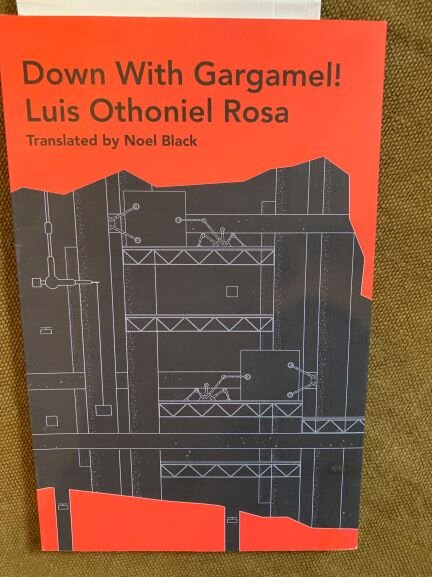Following on from Klossowski’s Suspended Vocation and Harris’s Da Silva da Silva’s Cultivated Wilderness and Genesis of the Clowns, I picked up another novella. The form sits well with me at this moment, when I still feel somewhat scattered—whereas a novel assumes your attention, a good novella compels it. Back in March when all things came to a halt, I pictured myself finally sitting down to some of those Victorian monsters I’d so long wanted to read: Daniel Deronda, Diana of the Crossways, Dombey and Son…but my heart wasn’t in it. Small seemed more beautiful. Believe it or not, it hadn’t really occurred to me before that my revival of this diary was impelled by the onset of the coronavirus pandemic. This strange new situation in which almost everything seemed moot made me want to lay claim to my own irresponsibility—and in the back of my mind, the most treasured irresponsibility turned out to mean just reading whatever I damned well felt like, without plan, without an end in view: to luxuriate in reading, however small the dosage, and forget the labor of writing.—But wait! You are writing!—this being a diary, after all. True, but I imagine these entries somehow retain at least a bit of the flavor of irresponsibility I associate with pure unproductive reading. Which sleight of hand I intend to work on this little book, Luis Othoniel Rosa’s Down With Gargamel!, which was kindly sent me by its translator, that excellent poet Noel Black. It’s a kind of science fiction, set mostly in the future, mostly in a post- or maybe mid-apocalyptic Puerto Rico that’s just a step ahead of the news. Presumably on the basis of the observation that “time is what makes us believe there are differences between things,” its six chapters are datelined 2028, 2017, 2037, 2701, 2033, and, again, 2017—the date of its original publication under what looks to this non-speaker of Spanish like a very different title: Caja de fractales. And there is something fractal, but paranoiacally so, about this book in which a character can see, for instance, “that there are clandestine machines creating other worlds inside this world.” Like most science fiction, Down With Gargamel! really concerns a certain present (consider “the inner workings of an underground abundance beneath the surface of a world shaped by scarcity”) though it might not be the one its author had in mind while writing it: In Rosa’s 2037, when communication has been established with galactically and therefore temporally far-flung civilizations despite the impossibility of faster-than-light travel, “Physical contact and material exchange are unthinkable. The only possible form of contact over interstellar distances is by way of radio waves. On a galactic level, all you can do is talk, and the only thing you can exchange are conversations”—as if he were allegorizing in advance the state of pandemic quarantine, the Age of Zoom. It’s form of communication based on temporal disconnection, and might explain why—against the tradition of the novella that follows a single inexorable line of fate and irony—Rosa’s capsule multiplicity, with its discontinuities but also its complex involutions, draws its formal unity mainly from an encompassing half-cynical lyricism, with as much affinity for Raymond Chandler as for Robert Bolaño, that holds out hope that “a fledgling new world would be born while the hulk of the old world rots.” Or maybe it’s just the shadow of a hope. Closer to the story’s heart, I suspect, is the thought that “We’re all children asking for explanations about how the universe works. The elders have that strange sensation—that emptiness before the abyss—that they will not be able to satisfy their curiosity before they die.” Coming up against my self-imposed limits of length, I realize I still haven’t mentioned the Smurfs, hallucinogenic drugs, anonymous books that are different for every reader and contain obituaries even of the living, manifestos, and plans for insurrection—let alone any of the characters, whose relationships may be more important than their individual identities. And the anglo-titular Gargamel? I can only say that one evening, catching sight of the slender book’s spine as it lay on the chest of drawers, I mistakenly read, Down With Origami!—and thereby got a title for a new poem.
❂
Luis Othoniel Rosa, Down With Gargamel!, translated by Noel Black, is published by Argos Books, no place of publication listed, 2020.
❂
BARRY SCHWABSKY is art critic for The Nation and co-editor of international reviews for Artforum. Along with many books on contemporary art, he’s published three books and several chapbooks of poetry as well as a collection of mainly literary criticism, Heretics of Language (Black Square Editions, 2017). His new book of poetry, A Feeling of And, will be published next year by Black Square.
